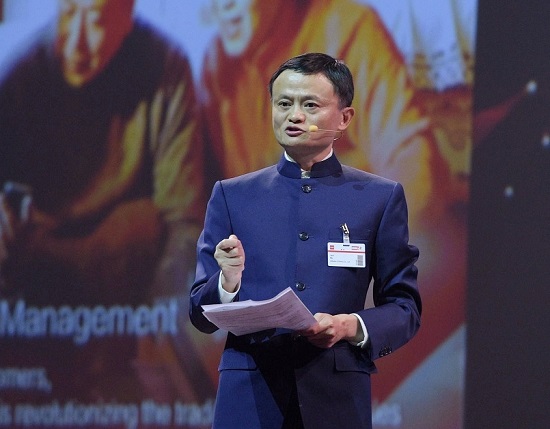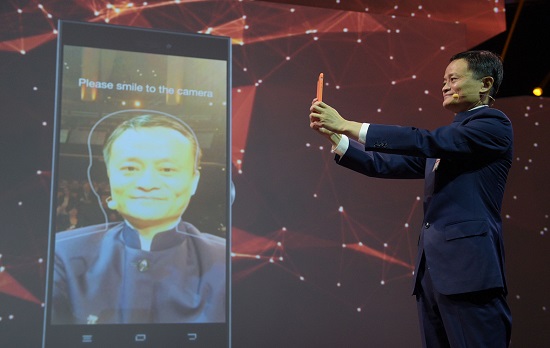Alibaba’s Jack Ma on why Internet giants are such worrywarts
By Goh Thean Eu March 17, 2015
- Believes the missing part of the Internet business is in Europe
- Demonstrates how face recognition technology can be used in e-commerce

IT appears that Alibaba Group Holdings Ltd founder Jack Ma (pic above) may be having some sleepless nights despite all the success his company has had.
Alibaba, one of the largest e-commerce companies in the world, currently holds the record for the largest initial public offering (IPO) in the world, having raised a grand total of US$25 billion when it listed on the New York Stock Exchange (NYSE) last September.
For the third quarter ended Dec 31, 2014, Alibaba’s revenue rose 40% to US$4.18 billion. During the three-month period, it also managed to grow its gross merchandise volume by 49% to US$125 billion, with an annual active buyers base of 334 million.
Today, its market capitalisation is more than US$200 billion.
“No doubt, the Internet [economy] for the past 20 years has been pretty successful,” Ma said in his keynote address at the opening ceremony of CeBIT 2015 in Hannover on March 15.
“But one thing that I find very strange is that very few Internet companies can survive peacefully and healthily for more than three years.
“Even though everyone believes that the Internet has made a huge impact and has done great things to the world, why are Internet companies always worried?
“Whether it is Google, Facebook, Yahoo!, or Alibaba, we are all worried, every day. We think that there must be a problem – the problem is that we must find a solution so that as a company, we can live a long, happy and healthy life, like Mercedes Benz and Siemens,” he added, referring to the German automotive and industry giants.
“An industry can never be a mainstream industry if it cannot live happily for more than three years.”
Bad experiences at CeBIT
Ma said this was his third visit to CeBIT, one of the world’s largest technology expositions, but added that his first two visits weren’t “successful.”
The first was 14 years ago, when he tried to rent a small booth to sell Chinese products to the Western European market.
“We spent a long time looking for a booth. At that time, Hannover was not that prosperous, but the fair was very successful. It was very difficult to get a booth.
“Finally we managed to get a booth, but very few people found us [at the expo],” he said.
Ma made another visit to CeBIT eight years ago, with the intention of convincing exhibitors to sell their products on Alibaba.
“It did not work at that time because people thought that trade fairs and [the online world] were in contrast to each other,” he said.
“Today, I come back again, and the reason I come back again is to try to find the missing part of the Internet business … I believe that it is in Europe,” he added.
Ma said that the key for Internet companies to surviving and enjoying long and prosperous lives would depend on how well they work together with traditional brick-and-mortar companies.
Alibaba’s future

During his keynote, Ma also took the opportunity to show off what could be a new feature in Alibaba’s services.
Using Alipay, he bought a 1948 souvenir stamp from Alibaba’s e-commerce site. The interesting part of this demonstration was that the confirmation of his purchase was not done via a card verification value (CVV) number or password, but via face recognition technology.
Using the front camera on his smartphone, Ma scanned his face to confirm the purchase (pic above). The stamp will be sent to the Mayor of Hannover’s office and is expected to arrive within few weeks.
“To buy things online can be a big headache. You forget your password and you worry about security,” he said, espousing the virtues of face-recognition.
Alibaba’s face recognition feature, called Smile To Pay, is currently in beta mode. If and when the feature officially rolls out, it will have a major impact on its customer base.
Today, Alibaba’s monthly active users on mobile have hit the 265-million mark. The company managed to grow its mobile gross merchandise volume by more than 200% to US$52.7 billion during the quarter ended Dec 31, 2014.
Goh Thean Eu reports from Hannover, Germany, at the invitation of CeBIT organiser Deutsche Messe AG. All editorials are independent.
Related Stories:
Jack Ma’s US inspiration set path to Alibaba IPO
ViSenze's mission is to make sense of the visual web
CeBIT 2015 theme ‘d!conomy,’ goes up to 11 for startups
For more technology news and the latest updates, follow us on Twitter, LinkedIn or Like us on Facebook.


